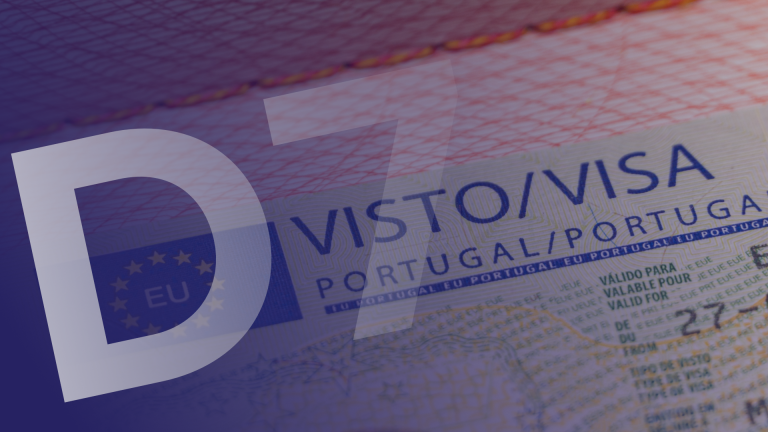
Posted on: 18th June 2021
All you need to know about Portugal's D7 Visa
**Some of the Portugal Golden Visa's rules and criteria have changed since this article was published. Please visit our Portugal residency by investment page for the latest information and to download a factsheet.**
As the UK no longer belongs to the European Union (EU), Britons are considered third party nationals when travelling or living in the bloc. Many of them had taken advantage of the right to move freely and work in the EU, without the need for a visa.
However, things have changed since January 1st 2021 and Britons should qualify for a permit to be able to live in the EU. For Britons who would like to live in Portugal, the D7 visa is one of the best options.
Which visas are available in Portugal
One of the most popular ways to be granted the Residence Permit in Portugal is the Golden Visa. The Golden Visa is a citizenship-by-investment programme that allows third-country nationals to become citizens of Portugal in exchange for an investment in local property, business, government bonds or simply by depositing an amount of money in a Portuguese bank for a specific number of years.
Although the requirements are scheduled to be changed, the Portuguese Golden Visa programme is still one of the most attractive ones in the EU. For more info, please read our blog .
In Portugal, there are several types of visas and residence permits to accommodate the needs of every individual:
Short-term work visa
A short-term work visa is required for temporary contracts lasting less than six months. The temporary-stay visa can also be extended up to one year if you are engaged in scientific research, academic teaching, or highly qualified professional activities.
Long-term work visa
Non-EU nationals who intend to work in Portugal longer than six months should get a long-term work visa. The work visa is in the form of a long-term Schengen Visa, enabling holders to travel across the 26 Schengen area countries. It should be noted that to work in another Schengen country, the citizen must go through a local process that can differ according to the chosen country.
Employee residence permit
This is the standard residence permit for the majority of employees working in Portugal. Nowadays, the permit is normally valid for 2 years and can also be renewed for up to five years. You can read more about it here.
EU Blue Card
The Blue Card is practically a work visa and residency for highly qualified workers from non-EU countries. There are specific salary and qualifications requirements for candidates, which you can read here.
Self-employed workers’ permit
Non-EU nationals who would like to start their own business in Portugal have to follow the same process as simple employees to get a resident visa. However, authorities would require additional documents which would prove your business activities.
What is the D7 visa?
The D7 is one of the most popular visas among expats. Expats who have periodic passive income or the financial means to live in Portugal can apply for a D7 visa. Some expats call the D7 visa “visa for pensioners” or “income visa.”
As always, applicants should present certain documents at the Portuguese Consulate. Below you can see the list of mandatory documents:
Minimum passive income to apply for a D7 Visa
The D7 visa is ideal for people who have passive income. The amount of available passive income is a crucial factor for the success of the application. Portuguese authorities check if the applicant’s passive income is above €665 per month, which is the minimum wage in the country. They will also check if the yearly income is above €7,980, which is regarded as the minimum income that would secure a good standard of living.
It should be noted that relevant bank statements should back up the application. Applicants who wish to move to Portugal with their families should provide statements indicating higher incomes.
What if your D7 visa application is successful?
Successful applicants are issued with a residency visa which is valid for two years. When the two years pass and if you would like to maintain residency, you could be issued with a new residency visa that would be valid for three years. The visa will be revoked if you don’t spend six consecutive months or eight non-consecutive months in the country.
Holders of D7 visa in Portugal enjoy certain benefits. One of those is the freedom to travel to the Schengen area without needing a visa and without the 90-day limit putting a strain on your activities. D7 visa holders are entitled to healthcare coverage, and they can use the Portuguese Public Health Service without additional costs. The only requirement for that is to obtain their unique Utente number. Business activities can be carried out if they are authorised by the SEF.
Living in Portugal as an expat and Holborn
The process of obtaining a D7 visa in Portugal could be complicated for people who don’t have the necessary knowledge. If you would like to avoid problems during the application process, it would be best to seek advice from professionals with many years of relevant experience.
Our team at Holborn can help you make the process as smooth as possible and minimise the stress and the possibility of errors that would have as a result the rejection of your application. Get in touch with our experienced advisers today by filling in the contact form.
Need professional financial advice?
We have 18 offices across the globe and we manage over $2billion for our 20,000+ clients